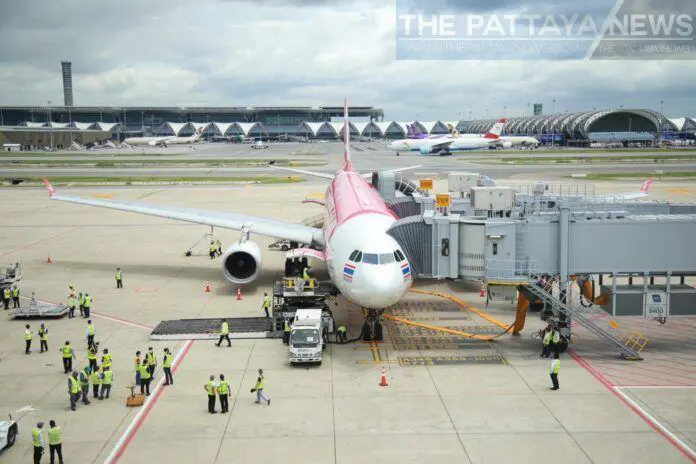
The landscape of air travel within and to Thailand has undergone a significant transformation with the official enforcement of a new, comprehensive law designed to protect air passenger rights. Effective today, Tuesday, May 20, 2025, this landmark legislation addresses the inconveniences and frustrations faced by travelers due to flight delays and cancellations. Spearheaded by the Civil Aviation Authority of Thailand (CAAT), the new passenger protection regulations, outlined under Civil Aviation Board Notification No. 101, mark a pivotal moment in the Thai aviation industry. These regulations are meticulously crafted to ensure that both domestic and international scheduled flight passengers receive enhanced support and fair compensation when their travel plans are disrupted. This development underscores Thailand's commitment to aligning its aviation standards with global best practices, prioritizing the well-being and rights of all air travelers. The implementation of this new flight delay and cancellation law signals a clear message to airlines operating in Thailand: the comfort and rights of passengers are paramount.
Key Provisions of the New Flight Delay and Cancellation Law
The newly enacted flight delay and cancellation law in Thailand introduces a robust framework of passenger rights, offering specific protections and outlining the responsibilities of airlines in the face of flight disruptions. These provisions are meticulously detailed to cover various scenarios, ensuring that passengers are adequately supported and compensated based on the duration and nature of the flight delay or cancellation. The core tenets of this new law revolve around providing timely information, essential care, and fair compensation to affected passengers.
Enhanced Compensation for International Flight Delays
The new regulations significantly bolster the compensation structure for international flight delays, particularly when passengers have already arrived at the airport without prior notification of the disruption. The extent of support and compensation is directly linked to the length of the flight delay.
Delays Exceeding Two Hours
For international flight delays lasting more than two hours, airlines are now mandated to provide essential care to affected passengers. This includes:
- Complimentary Food and Beverages: Airlines must offer meals and drinks or provide coupons of appropriate value, taking into account the time of day and the duration of the flight delay. This ensures that passengers are not left without sustenance during extended waits at the airport.
- Free Communication Tools: Passengers are entitled to access free communication facilities, such as phone calls or email, allowing them to stay connected with family, friends, or business associates and make necessary arrangements due to the flight delay.
Delays Exceeding Five Hours
When an international flight delay extends beyond five hours, the obligations of airlines increase to include not only the provisions for two-hour delays but also the following:
- Cash Compensation: Passengers are entitled to a minimum cash compensation of 1,500 baht. Airlines may also offer an equivalent value in alternative forms such as credit shells, travel vouchers, or frequent flyer miles, provided these are offered within 14 days of the flight delay incident. This financial compensation aims to acknowledge the significant inconvenience caused by the prolonged flight delay.
- Accommodation and Transfers: If the flight delay necessitates an overnight stay, the airline is responsible for providing suitable hotel accommodation and arranging for transportation between the airport and the hotel. This ensures that stranded passengers have a comfortable place to rest.
- Option for Cancellation and Refund: Passengers are given the right to cancel their journey and receive a full refund of their ticket cost. Alternatively, they may opt for other forms of compensation, such as travel credit or vouchers for future use. This provision offers flexibility to passengers whose travel plans are severely impacted by the extended flight delay.
Delays Exceeding Ten Hours
In cases of extreme international flight delays exceeding ten hours, the compensation structure is further tiered based on the distance of the flight:
Flight Distance | Cash Compensation |
| Not exceeding 1,500 kilometers | 2,000 baht |
| Between 1,500 and 3,500 kilometers | 3,500 baht |
| Over 3,500 kilometers | 4,500 baht |
In addition to this increased cash compensation, which must be paid within 14 days, airlines must continue to provide the same level of support as for delays exceeding two and five hours, including meals, beverages, communication facilities, accommodation, and transfers if required. Passengers also retain the option to cancel their journey and receive a full refund or alternative compensation.
Enhanced Protection for International Flight Cancellations and Denied Boarding
The new flight delay and cancellation law also provides significant protection to passengers in the event of international flight cancellations or denied boarding. Unless specific conditions are met, passengers are entitled to the same level of compensation as for flight delays exceeding ten hours.
Compensation for Flight Cancellations and Denied Boarding
Passengers facing international flight cancellations or denied boarding are eligible for the tiered cash compensation based on flight distance, as outlined for delays exceeding ten hours. They are also entitled to the same support measures, including meals, communication, accommodation, and transfers if necessary. Furthermore, they have the right to a full refund or alternative transportation to their final destination or a nearby location.
Exceptions to Compensation
Airlines are exempt from providing compensation for flight cancellations or denied boarding under the following circumstances:
- Advance Notice of Cancellation: If the airline notifies passengers of the flight cancellation at least seven days before the scheduled departure date.
- Alternative Flight Offered: If the airline provides an alternative flight that allows passengers to depart no more than three hours before the original departure time and arrive at their final destination no more than three hours after the originally scheduled arrival time.
- Force Majeure: If the flight cancellation is due to extraordinary and unavoidable circumstances beyond the airline's control, such as severe weather conditions or political instability, provided the airline has taken all reasonable measures to mitigate the impact.
Updated Compensation for Domestic Flights
The new flight delay and cancellation law also brings about significant improvements in the compensation provided to passengers on domestic flights experiencing disruptions.
Increased Compensation for Domestic Flight Delays
For domestic flight delays exceeding five hours, the cash compensation has been substantially increased from 600 baht to 1,200 baht. This doubling of the compensation reflects the law's commitment to ensuring fair treatment for all passengers, regardless of whether they are traveling domestically or internationally.
Increased Compensation for Domestic Flight Cancellations
In the case of domestic flight cancellations, the compensation has also been raised from 1,200 baht to 1,500 baht. This adjustment aims to provide more appropriate redress for the significant inconvenience caused by the cancellation of a domestic flight.
Alternative Forms of Compensation for Domestic Flights
Airlines operating domestic flights may also offer alternative forms of compensation to passengers affected by flight delays or cancellations, such as credit shells, travel vouchers, or frequent flyer miles. However, the value of these alternatives must be equal to or greater than the stipulated cash compensation. It is important to note that these alternative compensation options do not apply in cases where the disruption is caused by force majeure or other unavoidable situations.
Enhanced Protections During Tarmac Delays
Recognizing the discomfort and distress caused by prolonged tarmac delays, the new flight delay and cancellation law introduces specific protections for passengers in such situations. These regulations aim to ensure the basic well-being of passengers while they are held on the aircraft before takeoff.
Essential Care During Tarmac Delays
For delays where passengers are kept on the aircraft while it is still on the ground (tarmac delays), airlines are now required to:
- Provide Adequate Ventilation and Temperature Control: Airlines must ensure that the aircraft cabin maintains a comfortable temperature and has sufficient ventilation throughout the tarmac delay.
- Ensure Access to Lavatories: Passengers must be allowed access to the aircraft's lavatory facilities during the tarmac delay.
- Offer Urgent Medical Care if Needed: Airlines must be prepared to provide immediate medical assistance to any passenger who requires it during a tarmac delay.
Right to Disembark After Prolonged Tarmac Delays
If a tarmac delay extends beyond three hours from the scheduled departure time and there is no confirmed takeoff time, passengers must be given the opportunity to disembark from the aircraft. The only exceptions to this rule are situations where disembarking passengers would pose a safety or air traffic control risk. This provision aims to prevent passengers from being held on grounded aircraft for excessively long periods without any certainty of departure.
The Role of the Civil Aviation Authority of Thailand (CAAT)
The Civil Aviation Authority of Thailand (CAAT) plays a crucial role in the implementation and enforcement of the new flight delay and cancellation law. As the primary regulatory body for aviation in Thailand, the CAAT is responsible for ensuring that airlines comply with the provisions of Civil Aviation Board Notification No. 101.
Ensuring Awareness and Compliance
The CAAT has emphasized its commitment to working closely with airlines and the public to ensure widespread awareness of the new passenger rights and to facilitate full compliance with the regulations. This includes conducting information campaigns to educate passengers about their entitlements and working with airlines to establish efficient processes for providing support and compensation.
Monitoring and Enforcement
The CAAT will also be responsible for monitoring airlines' adherence to the new flight delay and cancellation law and for taking appropriate action in cases of non-compliance. This oversight is essential to ensure that the intended protections for air passengers are effectively realized and that airlines are held accountable for meeting their obligations under the new regulations.
Implications for Air Travelers and Airlines
The implementation of the new flight delay and cancellation law in Thailand has significant implications for both air travelers and airlines operating in the region.
Enhanced Passenger Confidence and Rights
For air travelers, these new regulations represent a substantial step forward in ensuring their rights are protected. Passengers can now have greater confidence that if their flights are disrupted, they will receive appropriate care, timely information, and fair compensation. This enhanced protection is particularly महत्वपूर्ण for those traveling on international flights, where disruptions can lead to significant inconvenience and additional expenses. The clarity provided by the new law empowers passengers to understand their entitlements and seek redress when necessary.
Increased Responsibilities and Costs for Airlines
For airlines, the new flight delay and cancellation law brings increased responsibilities and potential costs. Airlines will need to adapt their operational procedures to ensure they can effectively provide the mandated support and compensation to passengers during flight disruptions. This may involve investing in better communication systems, establishing clear protocols for handling delays and cancellations, and allocating resources for compensation payments, accommodation, and transfers. While these new requirements may present initial challenges, they also provide an opportunity for airlines to enhance their customer service and build greater trust with their passengers. Airlines that prioritize passenger welfare and proactively address disruptions are likely to foster greater customer loyalty in the long run.
Conclusion: A Positive Step Towards Passenger-Centric Aviation in Thailand
The enforcement of the new flight delay and cancellation law in Thailand marks a significant and positive development for the country's aviation industry. By enhancing air passenger rights and setting clear standards for airline responsibilities, Thailand is aligning itself with international best practices and demonstrating a commitment to providing a fair and supportive travel experience. The increased compensation for flight delays and cancellations, the specific protections during tarmac delays, and the clear guidelines for handling denied boarding situations will undoubtedly benefit travelers. While airlines will need to adapt to these new regulations, the ultimate outcome is expected to be a more passenger-centric aviation environment in Thailand, fostering greater trust and confidence in air travel. As the Civil Aviation Authority of Thailand (CAAT) works to ensure awareness and compliance, passengers can look forward to a more secure and equitable journey when flying to or within the Kingdom of Thailand. The new flight delay and cancellation law is not just a set of regulations; it is a commitment to valuing and protecting the rights of every air passenger.
;More Travel News
-
 07-Sep-2025Umrah Packages for Women: How Umrah for Ladies Differs from Umrah for Men
07-Sep-2025Umrah Packages for Women: How Umrah for Ladies Differs from Umrah for Men -
 08-Mar-2024China to Offer Visa Free Entry to Selected Countries
08-Mar-2024China to Offer Visa Free Entry to Selected Countries -
 29-Jan-2022Ways to Obtain Turkish Citizenship from Pakistan
29-Jan-2022Ways to Obtain Turkish Citizenship from Pakistan -
.webp) 16-May-2025Pakistan's Urgent Plea to Saudi Arabia: Reinstating the Private Hajj Quota for 67,000 Pilgrims
16-May-2025Pakistan's Urgent Plea to Saudi Arabia: Reinstating the Private Hajj Quota for 67,000 Pilgrims -
 04-Sep-2025Have a Safe Flight Meaning in Urdu | Wishes & Quotes for Safe Travels
04-Sep-2025Have a Safe Flight Meaning in Urdu | Wishes & Quotes for Safe Travels -
 08-Jan-2021Tanaqqol Best App for Pilgrims Book an Electric Cars
08-Jan-2021Tanaqqol Best App for Pilgrims Book an Electric Cars -
 16-Apr-2025New travel and access rules released for Makkah in preparation for Hajj 2025.
16-Apr-2025New travel and access rules released for Makkah in preparation for Hajj 2025. -
 15-Jan-2026Ziyarat Places Added to Umrah Packages 2026
15-Jan-2026Ziyarat Places Added to Umrah Packages 2026 -
 02-Jun-2021Why Turkey Is A World's Best Tourist Attraction
02-Jun-2021Why Turkey Is A World's Best Tourist Attraction -
 05-Jun-2023Top 10 places to visit in Turkey this summer of 2023
05-Jun-2023Top 10 places to visit in Turkey this summer of 2023 -
 16-Mar-2021Top 10 Best Sellers and Famous Pakistan Tour Packages
16-Mar-2021Top 10 Best Sellers and Famous Pakistan Tour Packages -
 11-Mar-2025Umrah 2025 Special: 15-Day Packages with Up to 20% Off
11-Mar-2025Umrah 2025 Special: 15-Day Packages with Up to 20% Off
